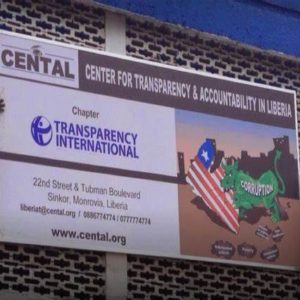PHOTO: Pres. George Manneh Weah vowed to fight this menace in 2018
By Our Staff Writer
Nearly four years into the CDC government of President George Manneh Weah, the fight against corruption is still lagging behind, with lack of political will and Liberian authorities’ failure to take action that would deter impunity, according to the latest report released by Liberia’s leading anti-graft campaign organization.
“The fight against corruption has been a mix of steady progress, challenges, and setbacks. While there are institutional and legal frameworks established to fight corruption, the constant lack of political will coupled with weak enforcement of anticorruption measures and limited prosecution of corruption cases remain fundamental obstacles,” this is one of the key conclusions reached in the latest state of corruption report 2021 released by the Center for Transparency and Accountability (CENTAL).
In his inaugural address on January 22, 2018 at the Samuel Kanyon Doe Stadium in Monrovia’s Paynesville suburb, President Weah promised that corruption will be an enemy of his government and made a solemn pledge to fight this menace.
“It is my belief that the most effective way to directly impact the poor, and to narrow the gap between the rich and poor is to ensure that public resources do not end up in the pockets of government officials. I further believe that the overwhelming mandate I have received from the Liberian people is a mandate to end corruption in the public service. I promise to deliver on this mandate. As officials of government, it is time to put the interest of our people above our own selfish interests. It is time to be honest with our people,” pledged Weah, the international football icon-turned President.
The latest CENTAL scope report, released this week, covers key development plus citizens’ views and experience of corruption in Liberia.

The report released by the Executive Director of CENTAL, Anderson Miamen, sys efforts by anti-graft institutions to curb the scourge of corruption are being “hindered by lack of fully constituted leaderships, limited financial support, and a weak justice system”.
“Impunity is also rife as multiple investigative and audits reports are attended with inaction, prosecution of corruption cases done selectively, and prosecuted cases often concluded with less than stringent penalties,” the state of corruption report added.
The report speaks of “scandals,” which it says, “reveal that effective leadership and oversight by public officials are mostly compromised by back-door deals, conflict of interests, embezzlement and bribery.”
It says Liberia officials have found a ‘safe’ way to engage in corruption.
And this way is “by ensuring that their private interests are satisfied through budgetary allocations rather than outright embezzlement.”
According to the report, “integrity institutions are supported below need.”
The CENTAL report is similar to the most recent United State Department report on the state of corruption in Liberia. The Americans said that there were numerous reports of government corruption.
It also said officials frequently engaged in corrupt practices with impunity, adding that the mandate of the Liberia Anti-Corruption Commission (LACC) is to prevent, investigate, and prosecute cases of corruption among public officials.
In its latest report, CENTAL also highlights the financial, logistical and other constraints facing integrity institutions in Liberia including the Liberia Anti-Corruption Commission (LACC) and the General Auditing Commission (GAC).
For the LACC, the report says it is being challenged by the lack of adequate logistics including computers to fast track the completion of investigative reports, as well as limited fuel supply and funding to support investigative operations and prosecution of corruption cases in all parts of the country.
“Millions of dollars have been spent on audits with little results to show,” the report says.
Most of the recommendations from the audits conducted by the GAC and validated by the Legislature “remain largely unenforced”.
The state of corruption report also points out “challenges undermining judicial integrity, independence, and performance have been further exacerbated by change in the mode and size of funding provided to the judiciary.”
It says quarterly allotments are no longer provided as required by law, and judges’ income has been sliced.
For full text of the CENTAL report, you can visit the group’s website: www.cental.org.lr

